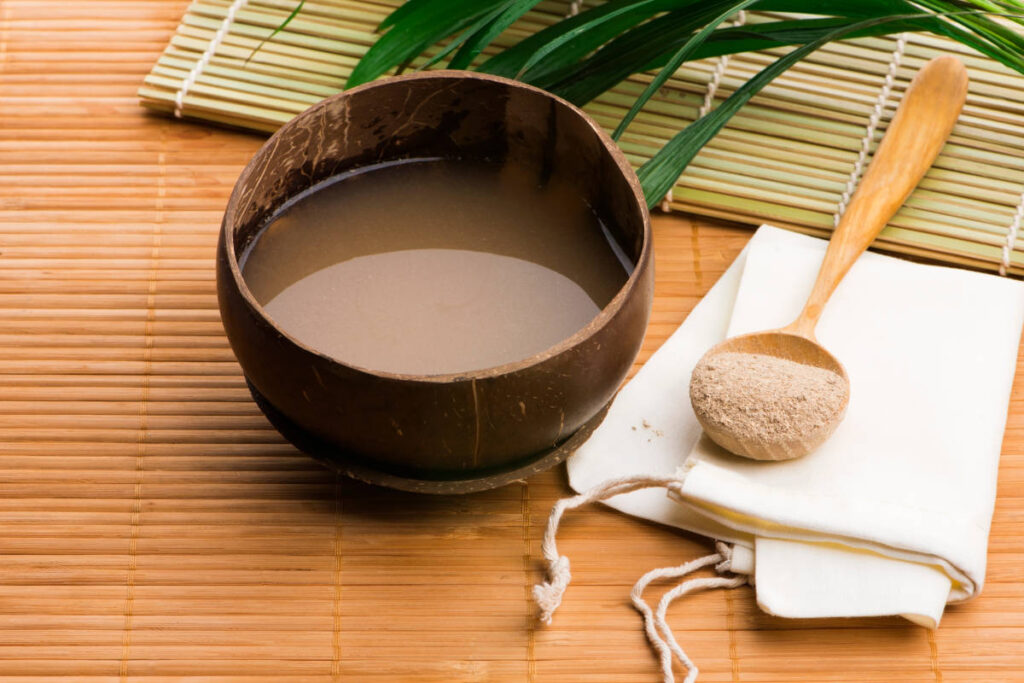

Section

Back
Best 11 Nervine Herbs For Brain and Body Support
06/26/2023 | Written by Kristen Boye
Herbal Secrets, Live Vibrantly

Have you used or heard the phrase: “My nerves are shot!”?
If you had conveyed this to a herbalist, Ayurvedic practitioner, or savvy mother or grandmother, they might have handed you a cup of soothing Chamomile or Tulsi tea.
Why? Because Chamomile and Tulsi are nervine herbs, a classification of plants that support nervous system function and promote a state of calm.
In this article, you’ll learn the history, practical application, and science behind eleven of the East’s and West’s most popular herbal nervines.
What Is A Nervine Herb?
Herbal nervines are a special group of plants that are uniquely classified to nourish the central nervous system and support healthy nervous system function.
When the nervous system functions normally, it helps sustain calmness, normal sleep, focus, clarity, and a healthy stress response.
Unfortunately, stress is tough on the nervous system, which is why nervine herbs have become so popular in the form of teas, supplements, tinctures, and essential oils.
Nervines may also be classified as:
- Adaptogens: A type of herb that helps support the body’s normal stress response
- Rasayanas: An Ayurvedic designation for herbs that function as tonics or rejuvenators for body and mind
- Nootropics: Herbs or other substances that support cognitive function.
You may also find nervines combined with adaptogens, Rasayanas, or other types of herbs in various Ayurvedic or traditional herbal formulas.
Nervines have been used for centuries in Eastern and Western wellness practices, including Ayurveda, and have gained popularity as people seek natural solutions to promote mind-body wellness and a sense of peace.

What Are The Benefits Of Nervine Herbs?
Nervines offer various benefits for mind-body health, with each herb possessing unique properties.
We’ll discuss herb-specific nervine benefits in the following sections.
However, here are some examples of the over-arching benefits all nervine herbs and plants share*:
- Nervine herbs support normal nervous system function
- Herbal nervines promote a state of calm
- Nervines support focus and concentration
- Nervine herbs may support the sleep cycle
- Herbal nervines support a normal stress response
- Nervines support adrenal health
In other words, nervines act as a balm for body, mind, and spirit amidst everyday life’s stresses and ups and downs.
Nervine herbs are also generally very safe for short- or long-term use, non-toxic, and easy to procure as supplements, bulk herbs, or by growing yourself.
If this sounds like something you’d benefit from, let’s get to know eleven of the top nervine herbs for mind-body support.
Top 11 Nervine Herbs For Mind-Body Support
Even if you’re new to herbs, you’ve probably experienced nervines in the form of herbal tea, essential oils, personal care products, or even oats.
In this section, we’ll explore eleven nervine herbs from Western herbalism and Ayurveda.
1. Chamomile
Chamomile is one of the world’s most ancient nervine herbs, with traditional use dating back to the ancient Egyptians.
Research has shown certain constituents within chamomile tea’s polysaccharides (a type of plant compound) may be responsible for its calming effects.
Feel the calm with Tulsi Honey Chamomile Tea.

2. Bacopa
Bacopa, also known as “Brahmi” or “The Herb of Grace”, is less-known in the West, however it is and has been a revered nervine in Ayurevda for centuries.
Also considered a nootropic, a type of nervine herbs that supports cognitive function, several high-quality studies have shown Bacopa supports various aspects of brain function while promoting a state of focused alertness.
Discover more fascinating facts about Bacopa in: Bacopa: An Ayurvedic Nootropic
Experience Bacopa’s cognitive-supporting force with Memory Gotu Kola & Bacopa Supplement.
3. Bibhitaki
Bibhaitaki, also known as Terminalia chebula, is the fruit of an evergreen species used in traditional wellness practices such as Ayurveda, Unani, and Homeopathy.
It is highly regarded for its universal versatility in Ayurveda and is considered an excellent nervine for occasional nervous irritability and promotes the receiving power of the five senses.
Enjoy the scope of Bibhitaki’s nervine and other benefits in a multi-herbal, digestive-supporting Triphala Capsule.
4. Ashwagandha
Ashwagandha is one of the most well-known Ayurvedic nervine herbs in the West, and one of the most common used in Ayurvedic formulas.
Also known as “Indian Ginseng”, Ashwagandha is considered the “king of adaptogens” due to its beneficial effects on stress. It’s also a helpful nervine and Rasayana, making it a popular choice for supporting stress response, mood, and sleep.
New research has validated the traditional use of Ashwagandha for these purposes, showing it may help support normal mood, cognitive function, and various aspects of sleep.
Discover more about Ashwagandha’s history and benefits in:
See for yourself why everyone is raving about Ashwagandha with this organic Ashwagandha Herbal Supplement.

5. Gotu Kola
Also known as the “Herb of Longevity,” Gotu Kola is a nervine, nootropic, and adaptogen used for centuries as a brain and nervous system support tonic.
It’s also one of the most commonly consumed leafy greens in many parts of Asia.
Research has shown Gotu Kola may offer a variety of mind-body benefits, including:
- Memory support
- Neuroprotective properties
- Promoting balanced energy
- Cognitive support
- Stress support
Learn more about Gotu Kola in: Gotu Kola: Herb of Longevity.
Feel the brain benefits with a Gotu Kola Herbal Supplement.
6. Shankhpushpi
Shankhpushpi is an ancient Ayurvedic nervine used for cognitive and digestive wellness.
Its Sanskrit name, Mangalyakushuma, means “bringer of good health and good fortune,” speaking to its mind-body-spirit benefits.
Research performed on Shankhpushpi has revealed several plant compounds that may interact with various aspects of brain and neurological function.
This is believed to potentially support various brain and nervous system functions, including normal memory, stress response, cognitive health, inflammatory response, and serotonin levels.
Learn more about the benefits and traditional uses of Shankhpushpi here.
Find Shankhpushpi in all its glory alongside many other herbs here listed in this Ayurvedic expert-curated, Joy! Supplement.
7. Tulsi (aka: Holy Basil)
Like Ashwagandha, Tulsi—especially Tulsi Tea—has earned a positive reputation in the West as a calming and soothing herb.
Known in Ayurveda as “the incomparable one”, with its effects described as “liquid yoga”, Tulsi is considered one of the ultimate adaptogens and nervine herbs.
It’s also been extensively researched, with evidence showing it may support:
- Attention and focus
- Normal mood
- Stress response
- And more
Tulsi is one of Organic India’s flagship herbs, so we can attest to its popularity and value!
Learn more about the incomparable Tulsi in:
Enjoy Tulsi Original Tea infusion and feel your worries melt away.
8. Lavender
The sight and scent of fresh Lavender is synonymous with relaxation, calmness, and tranquility. Hence its popularity in natural skin care, spa services, and essential oil blends.
Lavender’s nervine properties make it beneficial to take as a tea, food, or supplement too.
Various human and animal studies conducted on lavender and lavender essential oils have shown Lavender may support normal:
- Memory
- Stress response
- Nervous system function
- Sleep
- Mood
- Occasional anxiety
- Cognitive function
Lavender is lovely taken as a tea, used in recipes, applied topically through skincare products, or diffused as a pure essential oil.
9. Valerian
Valerian is a well-known nervine used in traditional herbalism for its supportive effects on sleep and stress response and for promoting relaxation.
Research, including double-blind placebo-controlled trials, has verified Valerian’s traditional use for sleep, stress, relaxation, occasional anxiety, and supporting normal mood.
10. Kava
If you’ve seen Kava bars or beverages popping up in your local city or town, that’s party because of Kava’s relaxation-inducing effects.
Several high-quality studies, including a Cochrane review, found Kava was effective for supporting a healthy state of mind, relaxation, sleep, and normal serotonin levels.

11: California Poppy
California poppy is a staple in many herbal supplements designed to support sleep and promote feelings of calm.
It is considered a nervine and tonic for the nervous system to promote feelings of well-being and support sleep during times of stress.
Although California Poppy does not have the breadth of studies as Valerian, Kava, or Ashwagandha, animal research has shown it may possess calming and sleep-supportive properties.
How To Start Using Nervines For Mind-Body Wellness
Nervine herbs are simple to incorporate into your healthy lifestyle.
Start by choosing one or two you’d like to try, Tulsi and Chamomile, for example, are widely available and taste great.
If you enjoy drinking tea (which in and of itself has been shown to promote calm), try a cup about 30 minutes to an hour before bed, after exercise, or at any time of day you feel the most stressed.
Continue this daily practice and see how it affects your overall mind and body health.
If you’re working with an Ayurvedic practitioner or herbalist, ask them which nervine herbs may suit your needs/doshas.
For more tips on supporting the resilience of body, mind, and spirit, check out:







 Kate Tant is a professional health and wellness writer with a strong passion for holistic wellness. Her writing covers topics from Ayurvedic herbs and practices to nontoxic living and intermittent fasting. She is dedicated to helping and encouraging individuals seeking natural solutions to their health.
Kate Tant is a professional health and wellness writer with a strong passion for holistic wellness. Her writing covers topics from Ayurvedic herbs and practices to nontoxic living and intermittent fasting. She is dedicated to helping and encouraging individuals seeking natural solutions to their health.